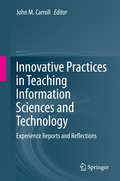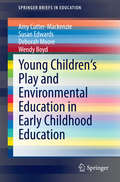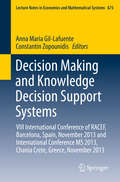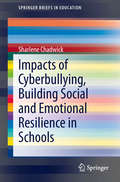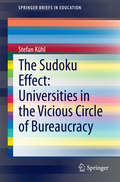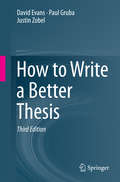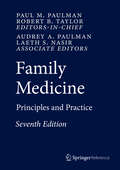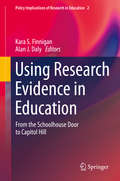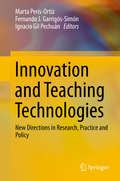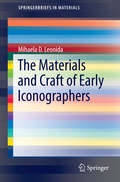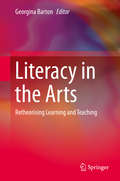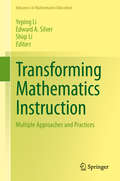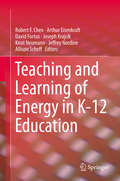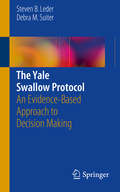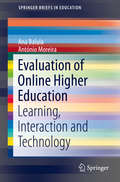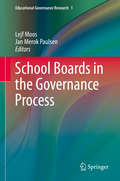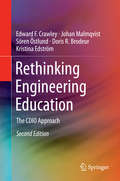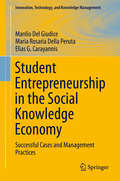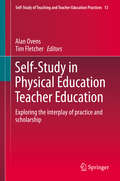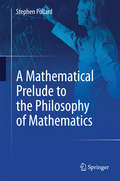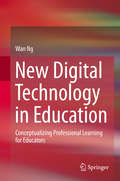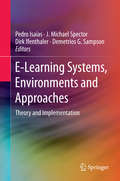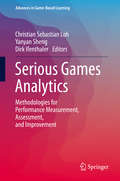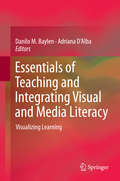- Table View
- List View
Innovative Practices in Teaching Information Sciences and Technology
by John M. CarrollUniversity teaching and learning has never been more innovative than it is now. This has been enabled by a better contemporary understanding of teaching and learning. Instructors now present situated projects and practices to their students, not just foundational principles. Lectures and structured practice are now often replaced by engaging and constructivist learning activities that leverage what students know about, think about and care about. Teaching innovation has also been enabled by online learning in the classroom, beyond the classroom and beyond the campus. Learning online is perhaps not the panacea sometimes asserted but it is a disruptively rich and expanding set of tools and techniques that can facilitate engaging and constructivist learning activities. It is becoming the new normal in university teaching and learning. The opportunity and the need for innovation in teaching and learning are together keenest in information technology itself: Computer and Information Science faculty and students are immersed in innovation. The subject matter of these disciplines changes from one year to the next; courses and curricula are in constant flux. And indeed each wave of disciplinary innovation is assimilated into technology tools and infrastructures for teaching new and emerging concepts and techniques. Innovative Practices in Teaching Information Sciences and Technology: Experience Reports and Reflections describes a set of innovative teaching practices from the faculty of Information Sciences and Technology at Pennsylvania State University. Each chapter is a personal essay describing practices, implemented by one or two faculty that challenge assumptions and push beyond standard practice at the individual faculty and classroom level. These are innovations that instructors elsewhere may find directly accessible and adaptable. Taken as a set, this book is a case study of teaching innovation as a part of faculty culture. Innovation is not optional in information technology; it inheres in both the disciplinary subject matter and in teaching. But it is an option for instructors to collectively embrace innovation as a faculty. The chapters in this book taken together, embody this option and provide a partial model to faculties for reflecting on and refining their own collective culture of teaching innovation.
Young Children's Play and Environmental Education in Early Childhood Education
by Susan Edwards Amy Cutter-Mackenzie Deborah Moore Wendy BoydIn an era in which environmental education has been described as one of the most pressing educational concerns of our time, further insights are needed to understand how best to approach the learning and teaching of environmental education in early childhood education. In this book we address this concern by identifying two principles for using play-based learning early childhood environmental education. The principles we identify are the result of research conducted with teachers and children using different types of play-based learning whilst engaged in environmental education. Such play-types connect with the historical use of play-based learning in early childhood education as a basis for pedagogy In the book 'Beyond Quality in ECE and Care' authors Dahlberg, Moss and Pence implore readers to ask critical questions about commonly held images of how young children come to construct themselves within social institutions. In similar fashion, this little book problematizes the taken-for-grantedness of the childhood development project in service to the certain cultural narratives. Cutter-Mackenzie, Edwards, Moore and Boyd challenge traditional conceptions of play-based learning through the medium of environmental education. This book signals a turning point in social thought grounded in a relational view of (environmental) education as experiential, intergenerational, interspecies, embodied learning in the third space. As Barad says, such work is based in inter-actions that can account for the tangled spaces of agencies. Through the deceptive simplicity of children's play, the book stimulates deliberation of the real purposes of pedagogy and of schooling. Paul Hart, University of Regina, Canada
Decision Making and Knowledge Decision Support Systems
by Constantin Zopounidis Anna Maria Gil-LafuenteThis book presents recent advancements of research, new methods and techniques, applications and projects in decision making and decision support systems. It explores expert systems and neural networks, knowledge engineering and management, fuzzy sets and systems and computational methods for optimization, data analysis and decision making. It presents applications in Economics, Finance, Management and Engineering. The book undertakes to stimulate scientific exchange, ideas and experiences in the field of decision making in Economy and Management. Researchers and practitioners alike will benefit from this book, when they are dealing with imprecision, vagueness and uncertainty in the context of decision making.
Impacts of Cyberbullying, Building Social and Emotional Resilience in Schools
by Sharlene ChadwickThis volume explores cyberbullying and its impact on young people in schools in detail. It investigates social and emotional resilience and wellbeing in relation to developing protective factors against the impacts of cyberbullying and contains a range of perspectives to deal positively with cyberbullying as well as a summary of international research. Cyberbullying occurs when any means of technology is used to repeatedly and deliberately engage in bullying behaviours with the intent to cause harm to others. Although anyone can be affected, young people who are also being bullied offline are more likely to be the target of cyberbullying. Forms of cyberbullying include: * abusive texts and emails * posting messages or images * imitating and excluding others online * inappropriate image tagging. Cyberbullying differs from face-to-face bullying. * a sense of anonymity for those who bully * can occur 24/7 and is invasive * can have a large audience * difficult to delete comments and images.
The Sudoku Effect: Universities in the Vicious Circle of Bureaucracy
by Stefan KühlThis book shows that the introduction of the European Credit Transfer System (ECTS) of credit points as a new accounting unit at universities has led to increased bureaucracy and the schoolmaster-style regimentation of Bachelor's and Master's courses. It explains how, due to the pressure of having to plan every single working hour of studying in advance, a 'Sudoku Effect' is created by the necessity to combine courses, exams and modules in such a way that the points 'add up'. An unintentional side effect of the introduction of the ECTS, the Sudoku Effect has led to more classroom style teaching, an inflation of exams and fewer choices available to students. It has resulted in such complex and contradictory guidelines for the planning of the curriculum that the values attributed to the higher education reform can often only be realised if the rules for Bachelor's and Master's programmes are ignored, or at least stretched, in practice. The book describes how the reaction to this situation is the continuous further refinement of the complicated rules rather than their abolishment.
How to Write a Better Thesis
by David Evans Paul Gruba Justin ZobelFrom proposal to examination, producing a dissertation or thesis is a challenge. Grounded in decades of experience with research training and supervision, this fully updated and revised edition takes an integrated, down-to-earth approach drawing on case studies and examples to guide you step-by-step towards productive success. Early chapters frame the tasks ahead and show you how to get started. From there, practical advice and illustrations take you through the elements of formulating research questions, working with software, and purposeful writing of each of the different kinds of chapters, and finishes with a focus on revision, dissemination and deadlines. How to Write a Better Thesis presents a cohesive approach to research that will help you succeed.
Family Medicine
by Robert B. Taylor Paul M. Paulman Audrey A. Paulman Laeth S. NasirMedical students will excel in their family practice clerkships with the practical information in this pocket-sized resource! It examines key clinical skills #65533; patients presenting with a sign, symptom, or abnormal lab value #65533; and patients presenting with a known condition-each in its own section for easy reference. Useful illustrations, key points, and clinical cases throughout the text put essential guidance at the reader's fingertips. Describes the special characteristics of a family medicine practice clerkship and provides guidance on working in an office-based community setting. Offers concise guidance on essential diagnostic tests and office procedures. Examines a broad range of physical and mental health issues for male and female patients across the lifespan. Addresses the questions students are most likely to be asked by attending physicians during their clerkship. Helps readers prepare for board exams with USMLE-style questions, answers, and rationales.
Using Research Evidence in Education
by Alan J. Daly Kara S. FinniganThis book includes a set of rigorous and accessible studies on the topic of "research evidence" from a variety of levels and educational vantage points. It also provides the reader with thoughtful commentaries from leading thinkers in the field. The complex process of acquiring, interpreting, and using research evidence makes for a rich and under examined area in educational research, practice and policymaking. Policy makers, practitioners and scholars are in need of additional knowledge and practical steps in terms of the uptake of evidence into practice. In addition, sharpening understanding in terms of the ways in which research evidence is shaped or adapted at different educational levels (school, district, state, federal) as well the factors that support or constrain the acquisition and use of research evidence is of immediate use. While professional support for evidence-based practice in schools has never been stronger, credible research has found only weak large-scale effects. This book provides us with key insights about the nature of this problem and a comprehensive approach to its solution; it is a major step toward realizing the considerable potential for school improvement of reciprocal working relationships among policy, practice and research communities. Ken Leithwood, Emeritus Professor, OISE/University of Toronto The problem of scant research use at school sites is old, but the federal to classroom level scope of this book is unique. The authors' analysis of the current status leads to despair, but they provide a clear and compelling path forward. Michael Kirst, Professor Emeritus, Stanford University; President, California State Board of Education. We have come a long way since the linear "Research, Dissemination, Utilization" models of knowledge use of the 1970s and 80s Each chapter in this book lays out new directions for understanding how individuals, relationships and systems advance or impede the movement of new ideas into policy/practice. Taken together, they redefine knowledge use as a dynamic process that affects and is affected by specific characteristics of the social structures in which is occurs It is a "must read" both for those interested in educational change and organizational theory. Karen Seashore Louis, Regents Professor, University of Minnesota
Innovation and Teaching Technologies
by Marta Peris-Ortiz Fernando J. Garrigós-Simón Ignacio Gil PechuánThis book focus on organizational changes that are taking place in higher education Universities are currently experiencing a period of change and restructuring into what is known as the European Higher Education Area (EHEA). EHEA represents a process of educational reform based on three types of transformations: structural, curricular and organizational. The integration of universities in this new EHEA is bringing conceptual and methodological changes not just to the structure of university education, but also to the teaching-learning processes and the conditions under which they take place. EHEA is prompting a change in the teaching model towards the consideration of students as the main actors in the educational process. This change requires new teaching strategies where students are asked to resolve problems with tools provided by the teacher This book presents ideas, results and challenges related to new information and communication technologies, innovations and methodologies applied to education and research, as well as demonstrating the latest trends in educational innovation.
The Materials and Craft of Early Iconographers
by Mihaela D. LeonidaThis book describes in detail the materials and techniques used by medieval iconographers. It offers information about the natural sources, the raw materials, the tools and the technologies involved in preparing them. The book allows entry into the secretive world of very knowledgeable and skilled artisans, about which very little is known. Topics covered include raw materials, pigments, binders, solvents, adhesives, inks and varnishes. Special chapters will be dedicated to the fresco technique as practiced by the early iconographers, grinding, painting on glass and the training/apprenticeship of these craftsmen.
Literacy in the Arts
by Georgina BartonThis book explores the many dialogues that exist between the arts and literacy. It shows how the arts are inherently multimodal and therefore interface regularly with literate practice in learning and teaching contexts. It asks the questions: What does literacy look like in the arts? And what does it mean to be arts literate? It explores what is important to know and do in the arts and also what literacies are engaged in, through the journey to becoming an artist. The arts for the purpose of this volume include five art forms: Dance, Drama, Media Arts, Music and Visual Arts The book provides a more productive exploration of the arts-literacy relationship. It acknowledges that both the arts and literacy are open-textured concepts and notes how they accommodate each other, learn about, and from each other and can potentially make education 'better'. It is when the two stretch each other that we see an educationally productive dialogic relationship emerge.
Transforming Mathematics Instruction
by Yeping Li Edward A. Silver Shiqi LiThis book surveys and examines different approaches and practices that contribute to the changes in mathematics instruction, including (1) innovative approaches that bring direct changes in classroom instructional practices, (2) curriculum reforms that introduce changes in content and requirements in classroom instruction, and (3) approaches in mathematics teacher education that aim to improve teachers' expertise and practices. It also surveys relevant theory and methodology development in studying and assessing mathematics instruction. Classroom instruction is commonly seen as one of the key factors contributing to students' learning of mathematics, but much remains to be understood about teachers' instructional practices that lead to the development and enactment of effective classroom instruction, and approaches and practices developed and used to transform classroom instruction in different education systems. Transforming Mathematics Instruction is organized to help readers learn not only from reading individual chapters, but also from reading across chapters and sections to explore broader themes, including: - Identifying what is important in mathematics for teaching and learning emphasized in different approaches; - Exploring how students' learning is considered and facilitated through different approaches and practices; - Understanding the nature of various approaches that are valued in different systems and cultural contexts; - Probing culturally valued approaches in identifying and evaluating effective instructional practices. The book brings new research and insights into multiple approaches and practices for transforming mathematics instruction to the international community of mathematics education, with 25 chapters and four section prefaces contributed by 56 scholars from 10 different education systems. This rich collection is indispensable reading for mathematics educators, researchers, teacher educators, curriculum developers, and graduate students interested in learning about different instructional practices, approaches for instructional transformation, and research in different education systems. It will help readers to reflect on approaches and practices that are useful for instructional changes in their own education systems, and also inspire them to identify and further explore new areas of research and program development in improving mathematics teaching and learning.
Teaching and Learning of Energy in K - 12 Education
by Arthur Eisenkraft Robert F. Chen David Fortus Joseph Krajcik Knut Neumann Jeffrey Nordine Allison ScheffThis volume presents current thoughts, research, and findings that were presented at a summit focusing on energy as a cross-cutting concept in education, involving scientists, science education researchers and science educators from across the world. The chapters cover four key questions: what should students know about energy, what can we learn from research on teaching and learning about energy, what are the challenges we are currently facing in teaching students this knowledge, and what needs be done to meet these challenges in the future? Energy is one of the most important ideas in all of science and it is useful for predicting and explaining phenomena within every scientific discipline. The challenge for teachers is to respond to recent policies requiring them to teach not only about energy as a disciplinary idea but also about energy as an analytical framework that cuts across disciplines. Teaching energy as a crosscutting concept can equip a new generation of scientists and engineers to think about the latest cross-disciplinary problems, and it requires a new approach to the idea of energy. This book examines the latest challenges of K-12 teaching about energy, including how a comprehensive understanding of energy can be developed. The authors present innovative strategies for learning and teaching about energy, revealing overlapping and diverging views from scientists and science educators. The reader will discover investigations into the learning progression of energy, how understanding of energy can be examined, and proposals for future directions for work in this arena. Science teachers and educators, science education researchers and scientists themselves will all find the discussions and research presented in this book engaging and informative.
The Yale Swallow Protocol
by Steven B. Leder Debra M. SuiterThe Yale Swallow Protocol is an evidence-based protocol that is the only screening instrument that both identifies aspiration risk and, when passed, is able to recommend specific oral diets without the need for further instrumental dysphagia testing. Based upon research by Drs. Steven B. Leder and Debra M. Suiter, an easily administered, reliable and validated swallow screening protocol was developed and can be used by speech-language pathologists, nurses, otolaryngologists, oncologists, neurologists, intensivists and physicians assistants. In addition, the protocol can be used in a variety of environments, including acute care, rehabilitation and nursing homes. The Yale Swallow Protocol meets all of the criteria necessary for a successful screening test, including being simple to administer, cross-disciplinary, cost effective, acceptable to patients and able to identify the target attribute by giving a positive finding when aspiration risk is present and a negative finding when aspiration risk is absent. Additionally, early and accurate identification of aspiration risk can significantly reduce health-care costs associated with recognized prandial aspiration.
The Visual Language of Technique
by Luigi CocchiarellaThe book is inspired by the third seminar in a cycle connected to the celebrations of the 150th anniversary of the Politecnico di Milano (July 2013). "Educating by Image. Teaching Styles vs Learning Styles" was the motto of this meeting. The contributions (coming from lectures, the poster session, interviews and round table) aim to propose an updated look at visual education, highlighting how digital tools and networks have profoundly affected the "representational styles" of the teachers and the "cognitive styles" of the learners, while at the same time reaffirming the importance of the interaction between the two groups. As Herbert Alexander Simon once said, "Learning results. . . only from what the student does and thinks"; therefore "the teacher can advance learning only by influencing what the student does to learn". That is no mean feat if we consider that, according to Benjamin Samuel Bloom, visual education not only involves the pure cognition, but also the affective and the psychomotor domains, not to mention the social aspects. This is why, alongside some theoretical and historical retrospectives, the contributions recommend a continuous revision of "what" and "how" could be included in the academic curricula, also in connection with secondary schools, the professional world, targeted Lifelong Learning Programmes for students and teachers. The volume includes an interview with the science journalist and writer Piero Angela.
Evaluation of Online Higher Education
by António Moreira Ana BalulaThe work presents a theoretical framework for the evaluation of e-Teaching that aims at positioning the online activities designed and developed by the teacher as to the Learning, Interaction and Technology Dimensions. The theoretical research that underlies the study was developed reflecting current thinking on the promotion of quality of teaching and of the integration of information and communication tools into the curriculum in Higher Education (HE), i. e. , bearing in mind some European guidelines and policies on this subject. This way, an answer was sought to be given to one of the aims put forward in this study, namely to contribute towards the development of a conceptual framework to support research on evaluation of e-teaching in the context of HE. Based on the theoretical research carried out, an evaluation tool (SCAI) was designed, which integrates the two questionnaires developed to collect the teachers' and the students' perceptions regarding the development of e-activities. Consequently, an empirical study was structured and carried out, allowing SCAI tool to be tested and validated in real cases. From the comparison of the theoretical framework established and the analysis of the data obtained, we found that the differences in teaching should be valued and seen as assets by HE institutions rather than annihilated in a globalizing perspective.
School Boards in the Governance Process
by Lejf Moos Jan Merok PaulsenThis book analyses local school district governance in a comparative, cross-cultural perspective based on national studies of local school boards in the Nordic countries, Denmark, Finland, Norway and Sweden. The overarching research question explored by the national studies contained in this volume is: How are transnational influences of standardization and accountability, alongside national policies, transformed into local policy cultures by the school boards? In all the Nordic countries, the municipalities are equivalent with the school district level, and municipalities, as such, play a role as the interface between state policies and the schools. This book discusses the variation across different national systems in the Nordic countries in the degree of decentralism, as well as the processes through which sources of political autonomy are put into practice by school boards. It explores the interplay between context and policy-making at the local level, and analyses how local discourses expressed by school boards differ from national policies and trans-national influences. The book's analysis of the country-cases and thematic chapters shows that there are both important similarities and significant differences in governance functions, power relations and understandings of school board chairs and members between the countries studied. Moreover, the book analyses the many ways in which these similarities and differences affect the work context of school leaders and teachers in the Nordic countries.
Rethinking Engineering Education
by Edward F. Crawley Johan Malmqvist Sören Östlund Doris R. Brodeur Kristina EdströmThis book describes an approach to engineering education that integrates a comprehensive set of personal, interpersonal, and professional engineering skills with engineering disciplinary knowledge in order to prepare innovative and entrepreneurial engineers. The education of engineers is set in the context of engineering practice, that is, Conceiving, Designing, Implementing, and Operating (CDIO) through the entire lifecycle of engineering processes, products, and systems. The book is both a description of the development and implementation of the CDIO model and a guide to engineering programs worldwide that seek to improve the education of young engineers.
Student Entrepreneurship in the Social Knowledge Economy
by Maria Rosaria Della Peruta Manlio Del Giudice Elias G. CarayannisTraditionally, the study of entrepreneurial behavior focuses on such factors as (i) the personality characteristics that distinguish the entrepreneur from non-entrepreneur and (ii) demographic characteristics such gender, age, familiar antecedents and education. With particular respect to investigating the development, acquisition, and dissemination of entrepreneurial skills and behaviors, the authors focus on the university environment, as a locus of research and innovation, where students are exposed to a wide variety of influences that are enhanced by a high degree of connectivity. The underlying theme of this volume is to develop our understanding of the sociology of student entrepreneurial behavior and in doing so attempt to synthesize literature investigating individual talent with the literature on concurrent knowledge sourcing in the pursuit of entrepreneurial activities. Specifically, the authors investigate the degree to which access to diverse knowledge (in addition to such psychological characteristics and tolerance of ambiguity and risk taking) influences the nature and probability of entrepreneurial success. Moreover, they explore the role of social media and social networking in facilitating access to distributed and disparate information and knowledge Their research addresses such timely questions as: Where do entrepreneurial opportunities come from? How can higher education best stimulate the creation of firms emanating from young and smart minds in colleges and universities? What is the value of MOOCs for frequent, early, and "thick" communication among the various specialties needed to accomplish entrepreneurial projects? How do we know whether social media affect students' responses to new knowledge and new ideas? To what extent do educational practices affect racial and ethnic differences in student entrepreneurship? What is the role of the indigenous minority student entrepreneur in establishing high-technology firms? The result is a multi-dimensional approach that sheds light on the dynamics of education, knowledge creation, social networking, innovation and new business development.
Self-Study in Physical Education Teacher Education
by Alan Ovens Tim FletcherIn this in-depth examination of self-study as a research methodology, an international selection of physical education scholars share their ideas and experiences and consider the value of self-study as a vector for highlighting the emerging conflicts, dilemmas, and debates currently developing in teaching and teacher education pedagogies. A vital new addition to Springer's series Self-Study of Teacher Education Practices, the volume is divided into three sections assessing the significance of the approach itself, offering detailed subject-relevant case studies, and exploring the nuances and controversies attending the evolution of the methodology. The contributors show how self-study enables reflexivity in pedagogical practice, a notable lacuna in current critical research, and at the same time they make the technique accessible to scholars of physical education wanting a practicable introduction to the subject. The analysis also explores the implications of applying self-study to pedagogy itself, to the curriculum, and to human movement and educational practice more generally. By embracing more organic, emergent notions of research practice and learning, the book achieves a broader and more inclusive survey of pedagogical work in physical education teacher education that fully acknowledges the complexities of the field.
A Mathematical Prelude to the Philosophy of Mathematics
by Stephen PollardThis book is based on two premises: one cannot understand philosophy of mathematics without understanding mathematics and one cannot understand mathematics without doing mathematics. It draws readers into philosophy of mathematics by having them do mathematics. It offers 298 exercises, covering philosophically important material, presented in a philosophically informed way. The exercises give readers opportunities to recreate some mathematics that will illuminate important readings in philosophy of mathematics. Topics include primitive recursive arithmetic, Peano arithmetic, Gödel's theorems, interpretability, the hierarchy of sets, Frege arithmetic and intuitionist sentential logic. The book is intended for readers who understand basic properties of the natural and real numbers and have some background in formal logic.
New Digital Technology in Education
by Wan NgThis book addresses the issues confronting educators in the integration of digital technologies into their teaching and their students' learning. Such issues include a skepticism of the added value of technology to educational learning outcomes, the perception of the requirement to keep up with the fast pace of technological innovation, a lack of knowledge of affordable educational digital tools and a lack of understanding of pedagogical strategies to embrace digital technologies in their teaching. This book presents theoretical perspectives of learning and teaching today's digital students with technology and propose a pragmatic and sustainable framework for teachers' professional learning to embed digital technologies into their repertoire of teaching strategies in a systematic, coherent and comfortable manner so that technology integration becomes an almost effortless pedagogy in their day-to-day teaching. The materials in this book are comprised of original and innovative contributions, including empirical data, to existing scholarship in this field. Examples of pedagogical possibilities that are both new and currently practised across a range of teaching contexts are featured.
E-Learning Systems, Environments and Approaches
by Dirk Ifenthaler J. Michael Spector Demetrios G. Sampson Pedro IsaíasThe volume consists of twenty-five chapters selected from among peer-reviewed papers presented at the CELDA (Cognition and Exploratory Learning in the Digital Age) 2013 Conference held in Fort Worth, Texas, USA, in October 2013 and also from world class scholars in e-learning systems, environments and approaches. The following sub-topics are included: Exploratory Learning Technologies (Part I), e-Learning social web design (Part II), Learner communities through e-Learning implementations (Part III), Collaborative and student-centered e-Learning design (Part IV). E-Learning has been, since its initial stages, a synonym for flexibility. While this dynamic nature has mainly been associated with time and space it is safe to argue that currently it embraces other aspects such as the learners' profile, the scope of subjects that can be taught electronically and the technology it employs. New technologies also widen the range of activities and skills developed in e-Learning. Electronic learning environments have evolved past the exclusive delivery of knowledge. Technology has endowed e-Learning with the possibility of remotely fomenting problem solving skills, critical thinking and team work, by investing in information exchange, collaboration, personalisation and community building.
Serious Games Analytics
by Dirk Ifenthaler Christian Sebastian Loh Yanyan ShengThis volume brings together research on how gameplay data in serious games may be turned into valuable analytics or actionable intelligence for performance measurement, assessment, and improvement. Chapter authors use empirical research methodologies, including existing, experimental, and emerging conceptual frameworks, from various fields, such as: computer science software engineering educational data mining statistics information visualization. Serious games is an emerging field where the games are created using sound learning theories and instructional design principles to maximize learning and training success. But how would stakeholders know what play-learners have done in the game environment, and if the actions performance brings about learning? Could they be playing the game for fun, really learning with evidence of performance improvement, or simply gaming the system, i. e. , finding loopholes to fake that they are making progress? This volume endeavors to answer these questions.
Essentials of Teaching and Integrating Visual and Media Literacy
by Danilo M. Baylen Adriana D'AlbaThis book focuses on how to effectively integrate the teaching and learning of visual and media literacies in K-12 and higher education. Not only does it address and review the elements and principles of visual design but also identifies, discusses and describes the value of media in learning diverse and challenging content across disciplines. Finally, this book provides a balanced treatment of how visual and media literacies support deep content learning, student engagement, critical thinking, creativity, problem solving, and production.
